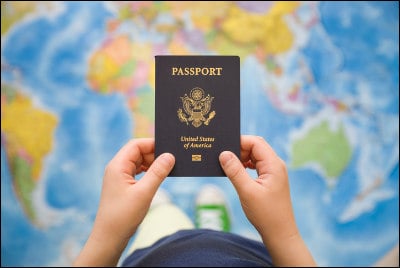 Passport applications for children under the age of 14 require the signatures of both parents. However, in situations where parents share joint legal custody, one parent may not consent and may actively seek to prevent the child’s removal from the United States. In these situations, state courts can authorize or restrict international travel, and may even order a parent to cooperate in securing a passport for their child.
Passport applications for children under the age of 14 require the signatures of both parents. However, in situations where parents share joint legal custody, one parent may not consent and may actively seek to prevent the child’s removal from the United States. In these situations, state courts can authorize or restrict international travel, and may even order a parent to cooperate in securing a passport for their child.
In 2001, the U.S. government began requiring both parents’ signatures on a minor child’s passport application. This rule applies to new passports for children under the age of 14. Children over the age of 16 only require one parent’s signature. Prior to 2001, one parent was able to complete a child’s passport application without the other parent being in agreement or even knowing that an application was submitted. The new rule was created to protect children from parental kidnapping during divorce and custody proceedings. The exception to the two-signature requirement is if one parent has sole custody of the minor child. In that case, only the custodial parent’s signature is required.
The two-signature requirement was not designed to allow one parent to control the other parent’s custodial and visitation time with the minor child. Rather, it was put in place to ensure the safety and well-being of children whose parents are involved in custody and divorce proceedings. By federal statute, the Secretary of State may issue a U.S. passport only to United States citizens and nationals. Every United States citizen is entitled to a U.S. passport provided that they, or an adult acting on a minor child’s behalf, comply with all applicable requirements, and that there are no statutory or regulatory reasons to deny the passport. This means that parents involved in custody disputes cannot refuse consent for the minor child to obtain a passport, unless they are able to persuade the judge that the other parent is a flight risk or may in some way use the child’s passport to the child’s detriment.
If one parent has concerns regarding the other parent kidnapping the child and traveling abroad, they can turn to certain remedies in state court. A state court has the authority to order a parent, possessing a child’s passport, to surrender the passport to the court. The court may then hold the passport for as long as it deems necessary to reduce the likelihood of the removal of the minor child from the United States. Extra precautionary steps may be taken and a report may be filed with the Office of Children’s Issues to prevent unauthorized attempts by one parent to replace the passport the court is holding. Additionally, a parent or an attorney may request to place the child’s name in the Children’s Passport Issuance Alert Program (CPIAP) Look Out System. Under this system, the Department of State will notify the requesting parent or attorney that a passport application is being filed for the child. In such cases, if the Department of State has a court order on file granting sole custody to one parent or restricting the child’s travel, the passport will be denied.
While these safeguards are put in place by government agencies, they are not established to preclude parents from traveling with their children post-divorce or post-custody determination. In Virginia, for example, in cases of joint legal custody a state court judge can authorize a parent to obtain a passport for a minor over the other’s objection by ordering the objecting party to sign the passport application or otherwise cooperating in the application as necessary. Thus, if parents who have joint legal authority over their child cannot agree on whether or not the child should obtain a passport, either can petition the court to require the other parent to cooperate. Additionally, if the parties cannot agree on whether or not the minor child should travel overseas, a state court judge can authorize or restrict international travel as part of its authority to determine custody and visitation issues.
If you have questions about how to proceed regarding a request for a United States passport for your minor child, either because you want to travel abroad or because you do not want your child to travel internationally, be sure to discuss your options with an experienced family law attorney. The family lawyers at Livesay & Myers, P.C. handle child custody cases and related issues across Northern Virginia. Contact us to schedule a consultation today.
See also: The Hague Convention and International Child Abduction
